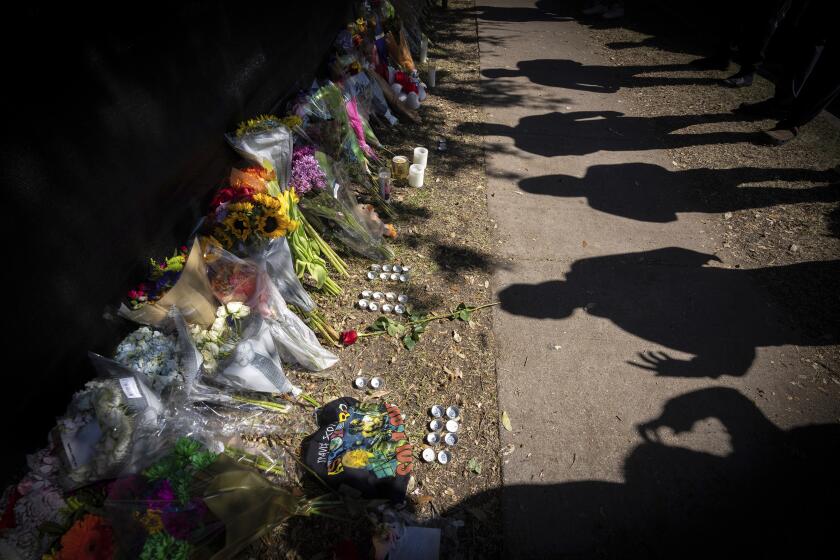A New Approach to Old Game
It’s gambling. It’s a waste of time. It encourages corruption and the bad element. It is one of the “Four Olds”--old ideas, old culture, old customs and old habits--attacked by the militant Red Guards under Chairman Mao.
For nearly half a century, China’s Communist rulers have tried nearly every tactic to discourage mah-jongg, the popular table game usually played by four people with 144 tiles--inscribed with numbers, symbols and Chinese characters--and a pair of dice.
During the 1966-76 Cultural Revolution, the game was actually banned; players were publicly persecuted. “If you wanted to play, you had to hide in a den like a criminal,” recalled one veteran player. It is still banned, quite unsuccessfully, on most college campuses.
Despite all efforts, however, the staccato clacking of the heavy plastic tiles can be heard behind closed doors in most apartment buildings and, increasingly, in special salons set up for the game in many hotels.
Defeated in its crusade to ban the game, the government has decided to play a new hand. Instead of trying to purge mah-jongg, authorities here have decided to reform it, reclassifying it as a “sport” and allowing public tournaments.
“Mah-jongg is a part of China’s folk culture and a traditional form of entertainment that challenges players’ wits,” said Xing Xiaoquan, a State Sports Commission official in charge of “redirecting” the game into a healthy pastime.
Early last year, officials experimented with a new format for the game--played in different versions around the world--and staged secret mock tournaments for party cadres in high-security state guest houses. This January, mah-jongg officially came out of the closet with the “Celebrity Red Bull Vitamin Drink Tournament,” featuring prominent actors, crooners, chess stars and politicians, plus retired party cadres and a champion gymnast.
Smoking and gambling were banned at the tournament, supervised by 27 specially trained umpires. Yelling was outlawed. Players took an oath promising that the competition would be “rule-abiding, civilized, refined and fair.”
*
Yan Bin, the Red Bull Vitamin Drink chairman, declared that the event should not be called “competition mah-jongg” but rather “healthy mah-jongg” or “hygienic mah-jongg.”
Some of the celebrity competitors dropped out, complaining that they didn’t like the new format. But the State Sports Commission declared the experiment a success.
Next month, said commission official Xing, a chain-smoking former volleyball player, the government will issue official rules for the game, which has a scoring system similar to that of duplicate bridge. After that, tournaments open to a broader cross-section of the population will be staged.
Many regular players, however, resent the puritanical state intrusion on their game. The current version of the game played in China came into prominence in the late 19th century in the city of Ningbo. It spread to the West via the foreign concessions in Shanghai and now is played around the world, including on the Internet. American devotees sponsor special mah-jongg cruises and Las Vegas tournaments.
Probably because of its gambling aspect, mah-jongg has often had a clandestine, rebellious air that resists state intervention. Old-timers here recall the days of the World War II Japanese occupation, when Manchurian players devised a version of the game called “kill the prime minister.” In that version, tiles were arranged in an elaborate play on words to suggest the assassination of Japan’s then-prime minister, Tojo Hideki.
*
Zhao Qiang, 67, a retired widow who lives in Beijing, called the latest government plan just another example of the state trying to take the fun out of holidays and festivals, when the game is played constantly in most households.
“They should spend their time and effort on something else more useful and significant,” Zhao complained. “First, they banned firecrackers, so that people have nothing fun to do on festive days. And now, more and more people are being laid off with time on their hands and nothing to do. They’re naive if they think by legalizing mah-jongg it will comfort people and stabilize society.”
Finally, many doubt the government’s ability to separate betting from the game. “There’s got to be some money involved,” said Shi Tao, 31, a business consultant in Beijing. “Otherwise there’s no fun.”
Besides, said one businessman, the game is too useful as a way to entertain and bribe public officials. The practice apparently had become so widespread in Sichuan, China’s most populous province, that the provincial government last March banned its finance officials from playing the game.
“In these games,” said a former hotel employee, “most of the players are officials invited by businessmen. The officials always win.”
More to Read
Start your day right
Sign up for Essential California for news, features and recommendations from the L.A. Times and beyond in your inbox six days a week.
You may occasionally receive promotional content from the Los Angeles Times.





